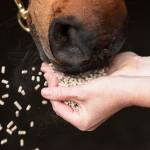Alfalfa Pellets for Severe Equine Asthma: Pros and Cons

A recent study found that feeding alfalfa pellets helps horses with severe asthma more than feeding steamed hay. However, offering a completely pelleted diet means horses do not have access to long-stem fiber, which is associated with important health concerns.
According to Canadian researchers, 15% of adult horses in the Northern Hemisphere are affected by severe equine asthma, which is often exacerbated by inhaling antigens and fine particles from hay during feeding.*
“Reducing exposure to those particles by avoiding dry hay and by housing horses outdoors are two of the main recommendations for managing equine asthma,” shared Ashley Fowler, Ph.D., a nutritionist for Kentucky Equine Research.
Instead of feeding dry hay, owners can offer steamed or soaked hay, pelleted feeds, or low-dust feeds such as oiled hay or haylage. According to the latest guidelines on managing asthma, adding specific omega-3 fatty acids to the diet also helps manage this disease.**
“EO-3, a supplement formulated by Kentucky Equine Research, contains high amounts of the long-chain omega-3 fatty acids EPA and DHA, which are precursors to inflammation-resolving molecules. Diets containing high amounts of grain or fat are often also high in omega-6 fatty acids, which eventually produce inflammatory molecules,” explained Fowler. “Both inflammatory and anti-inflammatory processes are essential to the horse, but for horses struggling with asthma, pushing the balance towards more anti-inflammatory processes through the supplementation of EPA and DHA is beneficial.”
To demonstrate the efficacy of feeding steamed hay and alfalfa pellets on controlling severe equine asthma, the Canadian researchers recruited 10 horses from the Université de Montréal’s Equine Asthma Research Laboratory and induced exacerbation of disease by feeding dry, dusty hay and housing them indoors.
Asthmatic horses were then fed either alfalfa pellets or steamed hay for four weeks. Lung function tests, bronchoalveolar lavage, mucus scores, and a “weighted clinical score” based on cough, respiratory rate and efforts, and nasal discharge associated with equine asthma severity were performed after exacerbation, immediately prior to dietary intervention, and again after the four-week dietary intervention.
The researchers found that feeding either steamed hay or alfalfa pellets improved clinical signs (based on weighted clinical scores), significantly decreased the number of neutrophils in bronchoalveolar lavage fluid cytology, and improved lung function.
“While both diets resulted in significant improvements, feeding the alfalfa pellets more reliably improved lung function,” summarized Fowler.
What makes these results even more impressive is that changing the diet was the only treatment for these horses and that treatment was initiated while horses were already in exacerbation of severe equine asthma.
Before jumping to a pelleted diet, Fowler warns owners that such diets should be managed carefully.
“Horses consume pellets much faster than they do the same weight of long-stem hay due to the reduced chewing requirements of pellets. When fed only pellets, horses will spend longer periods of time not eating, increasing the risks for gastric ulcers, boredom, and the development of stereotypies. Providing small, frequent meals of pellets or putting pellets into a slow-feeder device can help combat these issues,” Fowler said.
Additionally, Fowler said that hay pellets may not contain sufficient mineral and vitamin fortification to meet the horse’s basic nutrient requirements.
“Horses fed unfortified hay pellets should also be provided with a ration balancer, vitamin-mineral supplement, or fortified concentrate fed according to the manufacturer’s recommendations,” Fowler advised.
*Symoens, A., R. Westerfeld, B. Mozo Vives, V. Andre, L. Moulom, M. Collomb, H. Richard, T. Juette, C. Bedard, and M. Leclere. 2024. Steamed hay and alfalfa pellets for the management of severe equine asthma. Equine Veterinary Journal:14209.
**Couëtil, L.L., J.M. Cardwell, V. Gerber, J.-P. Lavoi, R. Leguillette, and E.A. Richard. 2016. Inflammatory airway disease of horses—Revised consensus statement. Journal of Veterinary Internal Medicine 30(2):503-515.








